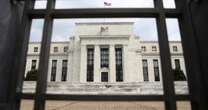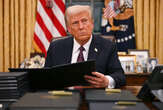Tesla’s stock (Nasdaq:TSLA) moved lower once again Monday, falling almost 5% in midday trading, the continuation of a fairly steady decline since Donald Trump took office.
Shares of the automaker (trading at around $384 per share in midday trading) are down more than $43 a share since their close on Jan. 17, a dip of more than 10%. That comes as CEO Elon Musk has been spending a large percentage of his time running the Department of Government Efficiency in Washington, D.C. and not focusing as heavily on Tesla.
The steady drop in Tesla’s stock is likely due to a variety of factors. Monday’s decline follows news that Tesla has lost market share in Sweden and Norway, despite a large increase in overall car demand.
In January, Tesla sold 405 new vehicles in Sweden, a 44% drop from the year prior. Norway was down 38% with 689 vehicle sales.
Also, the looming enforcement of tariffs on China and Canada (Mexico has been given a one-month delay) are scaring investors. Musk recently conceded on an earnings call with analysts that while Tesla has tried to localize its supply chain, it’s “still very reliant on parts from across the world for all our businesses. Therefore, the imposition of tariffs, which is very likely, will have an impact on our business and profitability.”
Canada is a key supplier of automotive parts, as is China. And Canadian officials are specifically focusing some of their ire about Trump’s tariffs on Musk. Premier Doug Ford announced Monday Ontario would scrap a $100 million contact with Starlink, which is part of Musk’s SpaceX. (Musk met that news with a tweet reading, “Oh well” Monday afternoon.)
Earnings miss
The concern surrounding overseas sales and tariffs comes on the heels of the company’s disappointing fourth quarter earnings last Wednesday. The company reported earnings of 73 cents per share, compared to analyst expectations of 76 cents and revenues of $25.71 billion, versus an anticipated $27.26 billion. Revenues were down 8% compared to the same quarter the year prior.
Last year marked the first time Tesla deliveries came in lower than the year before. All totaled, the automaker delivered 1.8 million vehicles to customers in 2024. (Tesla does not report precise sales figures, so deliveries are the best barometer of that figure.)
Tesla did not reply to Fast Company’s request for comment about the stock drop. The company did see a big surge in stock price following Trump’s election last November, but has surrendered most of those gains. Tesla closed at just over $342 per share on Nov. 20. It peaked just under $480, but now stands around $384.
Tesla stock also has a staggeringly high price-to-earnings ratio. On Monday, it stood at 188.95, compared to Apple and Microsoft, which are in the low- to mid-30s, and the average, which generally ranges from 20 to 25. (Higher P/E ratios indicate a company could be overvalued.)
Shareholder questions
Musk himself could be causing some of the investor agita, however. His focus on DOGE and government issues has not escaped the company’s shareholders.
Prior to the Q4 earnings call, investor-submitted questions in the company’s digital forum with a slew of concerns about the amount of time Musk is spending at the White House, along with some of his recent actions, including a gesture that has been likened to a Nazi salute. A sampling of those reads:
- “How much time does Elon Musk intend to spend at the White House and on government activities vs time and effort dedicated to Tesla?”
- “How much time does Elon Musk devote to growing Tesla, solving product issues, and driving shareholder value vs. his public engagements with Trump, DOGE, and political activities? Do you believe he’s providing Tesla the focus it needs?”
- “Does the board plan to review the negative image that Elon Musk is having on the Tesla brand and the conflicts between his politics and the Mission Statement?”
- “We can’t pretend that Elon’s erratic actions aren’t negatively effecting [sic] the stock price and brand’s reputation. What is your plan to curtail the CEO’s behavior, and/or replace his position to secure a more likely longevity as a brand?”
None of those questions were answered.










No comments